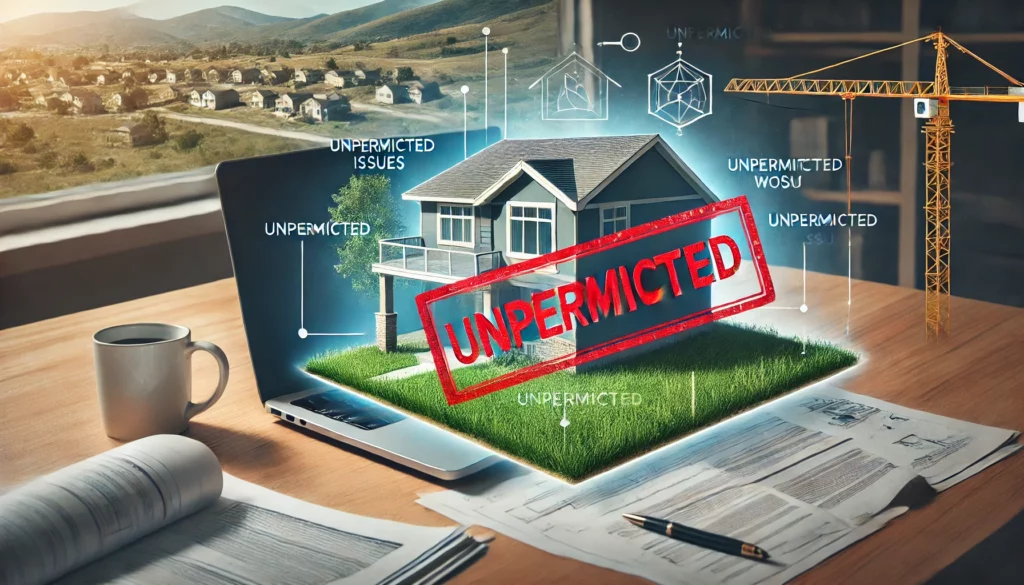What Is Unpermitted Work and How Does It Affect Home Sales?

Introduction
If you’re reading this blog, you likely find yourself in a situation where you’re considering selling your home but are unsure about how unpermitted work will impact the sale. You may be aware that some renovations or home improvements might not have been properly permitted, and now you’re questioning how this will affect the value of your property, your ability to sell, or if it will create legal issues down the road. You’re likely looking for clarity on whether unpermitted work will make it harder to sell your house, if potential buyers will be scared off, and what you should do to handle this situation. You might also be worried about the financial consequences of repairs or the added stress of dealing with local building codes and regulations. The uncertainty about how unpermitted work could affect your house’s sale is leading you here, and you’re hoping for straightforward advice and a solution to move forward with confidence.
In this blog, I’ll dive deep into the concept of unpermitted work, what it means for home sales, and how you can address it in a way that allows you to sell your property as smoothly and profitably as possible. As we move forward, I will provide you with the clarity and actionable steps you need to navigate this challenging situation.
What is Unpermitted Work and Why Does It Matter for Home Sellers?
When you make changes or improvements to your property, such as adding a room, building a deck, or installing a new system (like electrical, plumbing, or HVAC), it’s typically required that these alterations are approved and inspected by your local building authority. This process ensures that the work is safe, up to code, and legally documented. If these changes are made without obtaining the necessary permits, they’re considered “unpermitted work.”
Unpermitted work can be a significant issue for homeowners looking to sell. It’s crucial for sellers to understand why this matters. When you list a home for sale, most buyers will expect the property to comply with local building codes and regulations. Real estate professionals, home inspectors, and potential buyers may view unpermitted work as a red flag, which could lead to concerns about safety, property value, or even the legal risks associated with the property.
Moreover, some states and municipalities impose hefty fines on homeowners for unpermitted work, and buyers may face challenges obtaining financing for homes with unpermitted improvements. Understanding the implications of unpermitted work will help you make informed decisions, whether you’re considering selling your house as-is or taking steps to address the unpermitted work.
To gain deeper insight into building codes and permits in your area, visit this guide by MRSC for a thorough understanding of the building and safety codes you need to follow.
How Unpermitted Work Affects Home Sales
If you’re asking yourself how unpermitted work will affect your ability to sell, you’re not alone. In fact, it can impact your sale in several key ways. Let’s dive into the potential consequences of unpermitted work on your home sale.
1. Lower Property Value
One of the most significant impacts of unpermitted work is the potential reduction in your property’s value. Homebuyers are typically looking for homes that meet all local codes and regulations. If your home contains unpermitted work, this can create doubt in the minds of potential buyers. Buyers may feel hesitant to pay full price for a property if they think there could be issues with the unpermitted work in the future, or if they have to deal with fines or repair costs to make the home compliant.
For example, if you added a basement apartment without the proper permits, a buyer might factor in the cost of bringing it up to code or, worse, decide to avoid the property altogether. This could result in your home sitting on the market for longer than expected and could ultimately lead to a sale price that is below what you had hoped.
2. Financing Complications
Many buyers rely on financing options such as mortgages to purchase a home. Unfortunately, unpermitted work can make it more difficult to secure financing. Lenders often require that a home be up to code and may refuse to lend on properties with unpermitted work. This could limit your pool of potential buyers to cash buyers or those who can secure alternative forms of financing.
In fact, some lenders may even require an inspection to check for unpermitted work before approving a loan. If they find any, they may withhold the loan or insist on expensive repairs to bring the house into compliance with local building codes.
3. Inspection Issues
One of the most crucial steps in a real estate transaction is the home inspection. During this process, an inspector will thoroughly assess the property for any safety issues, structural problems, or illegal work. If the inspector finds unpermitted work, it may cause complications or delays in the sale.
For instance, if a buyer is keen on purchasing your home and an inspection reveals unpermitted additions or alterations, the buyer may request repairs or adjustments to bring the home up to code before moving forward with the sale. In some cases, the discovery of unpermitted work might even cause the buyer to back out of the deal entirely, leaving you with the task of starting over with another potential buyer.
If you want to explore the process of selling a home with unpermitted work for cash, which can avoid some of these issues, check out our detailed guide: How to Sell a House With Unpermitted Work For Cash.
Should You Correct Unpermitted Work Before Selling?
When faced with unpermitted work, one question often arises: should I correct the unpermitted work before selling? The answer depends on several factors, including the cost of repairs, the nature of the unpermitted work, and the local laws in your area.
1. The Cost of Permits and Repairs
In some cases, it might be worth correcting the unpermitted work, especially if it is a major issue, such as electrical or plumbing work. The cost of obtaining the proper permits and making necessary repairs can be substantial, ranging anywhere from a few hundred dollars to several thousand, depending on the scope of the work. For example, getting permits for a home addition may cost anywhere from $500 to $3,000, depending on your location and the size of the project.
However, even with the cost of repairs, correcting unpermitted work can provide peace of mind, knowing that the property is up to code. It can also help attract buyers who are looking for a home with no potential complications. But keep in mind that the investment in these repairs may not always guarantee you’ll get your money back on the sale price.
2. Local Regulations
Each municipality has different regulations regarding unpermitted work. In some cases, the local government may be willing to allow you to file for permits retroactively, especially if the work was done within a certain timeframe. In other cases, you may need to tear out unpermitted work entirely to bring the home into compliance.
If you are considering fixing the unpermitted work before selling, make sure to check with your local building department to understand the rules and regulations surrounding your property. The process can sometimes be lengthy, and there’s no guarantee that you’ll be able to bring the work up to code, depending on what was done.
How to Sell a House With Unpermitted Work
If correcting the unpermitted work seems like a hassle or too expensive, selling your home “as-is” could be a better option. Many motivated sellers with unpermitted work are turning to cash buyers for a quicker, smoother sale.
Cash buyers specialize in purchasing homes in any condition, including those with unpermitted work. By selling to a cash buyer, you avoid the long waiting period, expensive repairs, and stressful negotiations that typically come with selling through traditional methods.
1. The Benefits of Selling to Cash Buyers
Selling your home for cash has several advantages when dealing with unpermitted work:
- No Repairs Needed: Cash buyers are often willing to purchase homes without the need for you to make any repairs, including addressing unpermitted work.
- Quick Closing: Cash transactions typically close much faster than traditional home sales, often within 7-14 days.
- Avoid Legal Issues: Since cash buyers often purchase homes as-is, they assume the risks associated with unpermitted work, which means you won’t have to worry about future liabilities.
For more insights into selling a house as-is, refer to Bankrate which offers valuable tips for homeowners looking to sell without making repairs.
Conclusion: Is Selling a House With Unpermitted Work Right for You?
Selling a home with unpermitted work can be a challenging and stressful experience, but it’s far from impossible. While you might consider correcting the unpermitted work to attract more buyers and potentially secure a higher sale price, the costs involved in obtaining permits, making repairs, and dealing with delays may not always justify the outcome.
For many sellers, the most efficient and hassle-free option is to sell to a cash buyer like Sold First. We specialize in purchasing homes in any condition, including those with unpermitted work. Selling to us means you can avoid costly repairs, long inspections, and prolonged negotiations. Plus, with our quick and simple process, you can close your sale in a matter of days, not months.
At Sold First, we understand that every situation is unique, and we aim to make your selling experience as smooth as possible. If you’re ready to move forward and sell your home without the headaches of dealing with unpermitted work, we’re here to help. Reach out today to get your fair cash offer and take the first step toward a stress-free sale.

